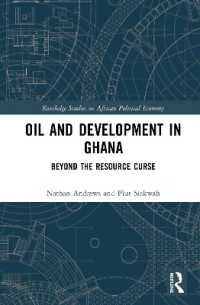- ホーム
- > 洋書
- > 英文書
- > History / World
Full Description
This book examines the role of (post)colonial ports in creating and shaping the ecotonal, cultural, historical, material, environmental, socio-political, and economic contexts in formerly colonized regions, spanning the Caribbean, Africa, North America, Europe, and the Pacific.
The essays assess the role that literature, visual culture, architecture, archives, and ethnography can play in enriching our understanding of the complex histories of ports and port cities. They present the relation between ports and colonial infrastructure such as immigration checkpoints, detention centers, mines, plantations, shipping containers, canals, sewers, and rivers, and their impact on human and more-than-human environments. The volume approaches (post)colonial ports through the "ecotone," a concept borrowed from geography and ecology to describe a transition zone where two biological communities meet and mix—such as a forest and a grassland—to bring attention to port (non)spaces as a hinge between their environments, communities, and colonial infrastructure. It foregrounds postcolonial and decolonial approaches to the ecotone to draw attention to the cultural, ecological, and geographical dynamics that inform the social fabric of contemporary ports and port cities in the wake of the empire.
This volume is aimed at scholars and postgraduates across disciplines such as literature, geography, fine arts, cultural studies, and history.
Contents
Introduction: Wading into 'the Wake' Section 1: Trans-Port 1. 'Fantasy in the Hold': The Logistics of Container Architecture, Transivity, and Queer Port Urbanisms 2. The Azulejo as Symbol of Colonial Power Structures: A Deconstruction Through Sugar and Art 3. Life and Death in the Port: Petromodernity and Fossil Capital in Abdelrahman Munif's Cities of Salt 4. Lost in Transit: Behrouz Boochani's No Friend but the Mountains: Writing from Manus Prison Section 2: Passages, Partings, Terminus 5. Placing and Dis/placing the Port: Towards a Critical Literary Geography of the Caribbean Port 6. Georgetown: Ecotonal Lessons of 'Secret Histories' 7. Going Against the Flow: Customs and Apartheid Censorship 8. Pèpè Ports: Haitian Women's Labour and Resistant Mobility in Cap-Haïtien's Second-hand Clothing Trade Section 3: Environmental Insecurities and Flows of Power 9. Where the Ozama Meets the Caribbean Sea: Dominican Art and Social Advocacy in the Ecotone 10. The Frontier and the Wasteland: 21st Century Gentrification Landscapes in Saint-Henri, Montreal 11. Watery Places and Relations: The Burial of a River and Modern Wasting Practices 12. Precious Water and Urban Practices in Ondjaki's Transparent City








